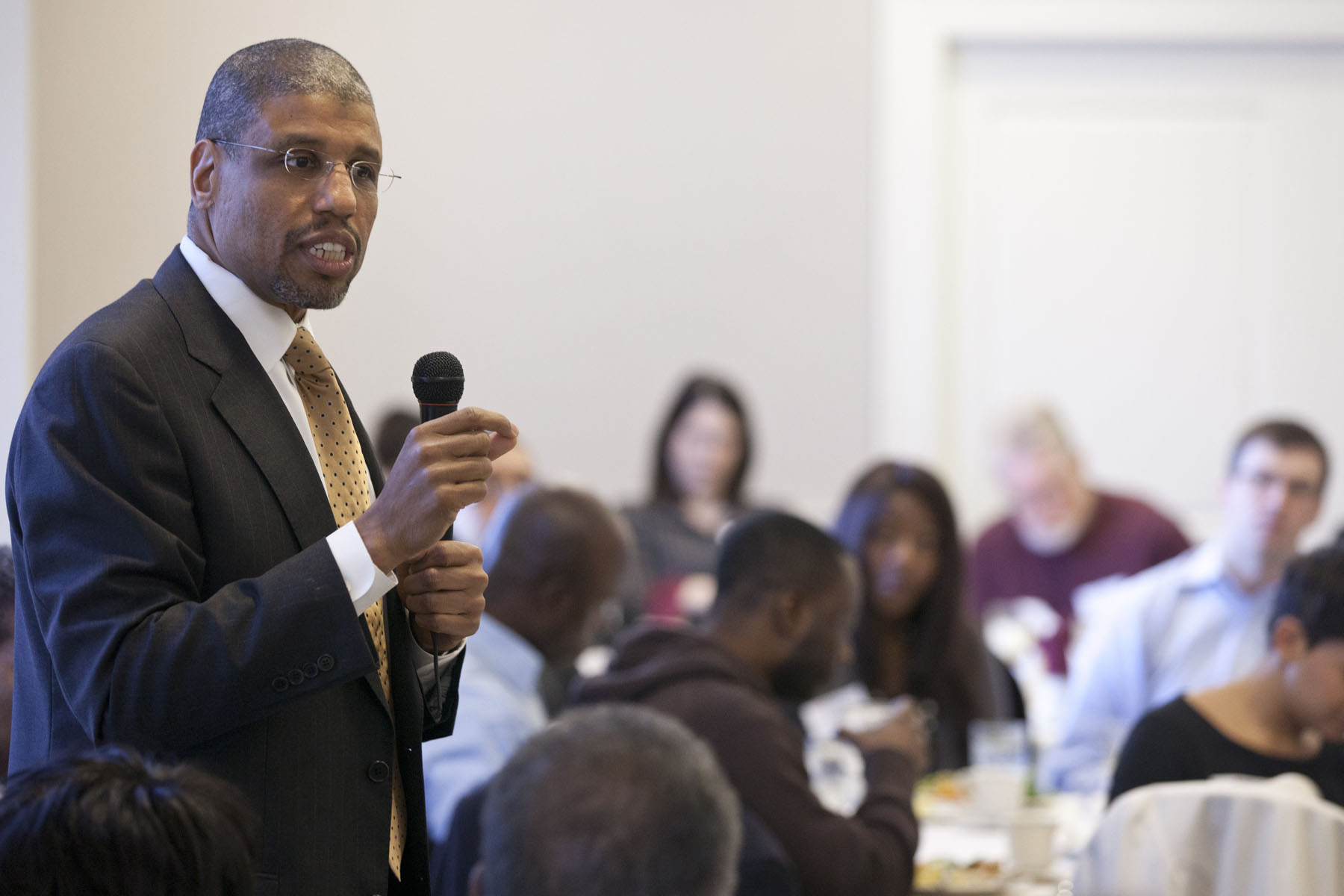"Be courageous," "build relationships" and "embrace the messiness" were a few of the thoughts shared by students, faculty, staff and guests during a luncheon Tuesday at the University of Virginia's Darden School of Business, part of the University's two-week celebration of the legacy of Martin Luther King Jr.
"The Future of Diversity: A Conversation on Education, Business and Difference" featured a panel of speakers from the U.Va. community and several other universities.
The panel's moderator, Darden professor Martin N. Davidson, opened the discussion with themes from his new book, "The End of Diversity as We Know It: Why Diversity Efforts Fail And How Leveraging Difference Can Succeed."
In a business context, he characterized "managing diversity" as only about hiring talent, and only about certain kinds of difference, such as race, gender and age. "It's relatively short-lived. You have to keep starting over. It's not energizing," he said. "And it's connected with fear and 'political correctness.'"
"A senior company leader asked me, 'So what? Why should I put so much energy into that when I should just be getting good talent?' It was an interesting question," Davidson said. "I thought part of what he was really asking was, 'Why we should explore diversity, above and beyond social justice?'"
After setting the stage for discussion, Davidson invited the panel members to share their backgrounds and ideas on the future of diversity and how they can succeed.
Paul T. Harper, who leads Darden's Summer Business Institute and is a religious studies instructor in the College of Arts & Sciences, said for him the question is not diversity, per se, but "relationships with diverse people."
"If I'm inviting people in from the community, but not going out into their community, that doesn't build relationships," he said. Sometimes the biggest goals start with the simplest of gestures, he said.
Dr. Marcus L. Martin, vice president and chief officer for diversity and equity at U.Va. and former chief of emergency medicine in the U.Va. Health System, said his experience in medicine helped him gain an understanding of people from many backgrounds, experiences and walks of life.
According to Karen L. Proudford, associate professor of management at Morgan State University's Earl Graves School of Business, those in a majority need to remember their positions of privilege relative to others who may face challenges.
"It was a blind spot for me not to recognize what it means to be a part of the majority," said Proudford, who recalled telling a new white colleague at their historically black institution that students weren't connecting to him because he was new, not because he was white. Proudford, who is black, later acknowledged her misstep.
"I went back to him and I said, 'I cannot believe I said that to you. It was such a disservice to your experience,'" she recalled.
Davidson said that, from a business point of view, it's important to have different sorts of people around the table. "There's a business case for diversity," he said. "We don't have to debate that anymore."
"Yes, we do," responded Terri Harris Reed, vice provost for diversity and inclusion at The George Washington University. "People don't necessarily agree that there's a benefit to diversity. This is the kind of pushback I get – that it's studied in a particular sort of way to get a particular set of outcomes. We get a good outcome even if there isn't diversity. So you can argue that it's a better outcome, but there's nothing wrong with the outcome that we have. It's good enough."
Audience members shared their experiences as well. One consultant discussed the challenges of working with companies that were more committed to a particular type of corporate culture than to diversity in hiring.
"We worked with a startup company that wanted to be that Silicon Valley, cool, creative workplace. Almost everyone was young and white," he said. "The HR folks were afraid that they were opening themselves up to lawsuits, lack of innovation and diversity in decision-making, but the leadership wasn't buying it because the cool, corporate culture was more important than anything else."
Diversity can lead to better collaboration and stronger partnerships, Proudford said. "Keep reaching out," she said. "Be authentic."
Media Contact
Article Information
January 27, 2012
/content/leveraging-difference-honor-martin-luther-king

